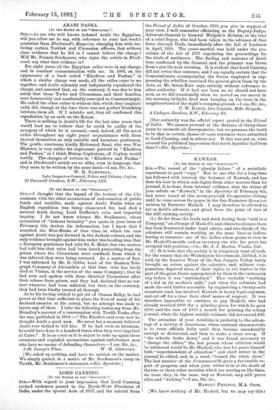ARABI PASHA.
[TO THE EDITOR 07 THE "SPECTATOR."] Six.,—As one who well knows Achmed Arabi the Egyptian, will you allow me to say, with reference to your last week's quotation from Blackwood's Magazine, charging him with tor- turing certain Turkish and Circassian officers, that without clear evidence that he did so I cannot believe the charge? Will Mr. Francis Scudamore, who signs the article in Black- wood, say what that evidence is ?
For eight years all the Egyptian exiles were in my charge, and in constant communication with me. In 1884, on the appearance of a book called "Khedives and Pashas," in which a similar charge was made, all the exiles came to me together, and Arabi solemnly and indignantly repudiated the -charge, and asserted that, on the contrary, it was due to him solely that these Turks and Circassian, and their families, were honourably and comfortably conveyed to Constantinople. He called the other exiles to witness this, which they emphati- cally did, though at the time there was not perfect friendship between them all. If I mistake not, they all confirmed this repudiation by an oath on the Koran.
There is nothing in Arabi's life for the last nine years that would lead me to believe that he could be guilty of the savagery of which he is accused,—and, indeed, all the seven exiles throughout my eight years' acquaintance with them showed themselves as only amiable and harmless gentlemen. The gentle, courteous, kindly Muhumud Sami, who was War Minister, is very unlike his unpleasant portrait in " Khedives and Pashas," as I think Bishop Coplestone, of Ceylon, would testify. The charges of torture in "Khedives and Pashas" and in Blackwood's article are so alike, even in language, that they seem to be written by the same hand.—I am, Sir, &c., W. R. CAMPBELL, Late Inspector•General, Police and Prisons, Ceylon. 50 Cornwall Gardens, S.W., February 11th.


































 Previous page
Previous page